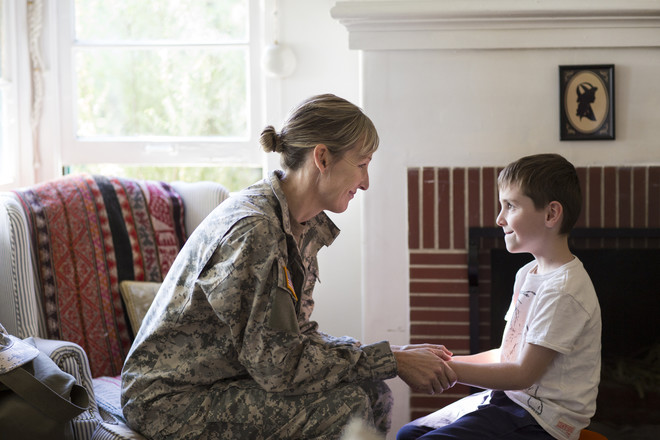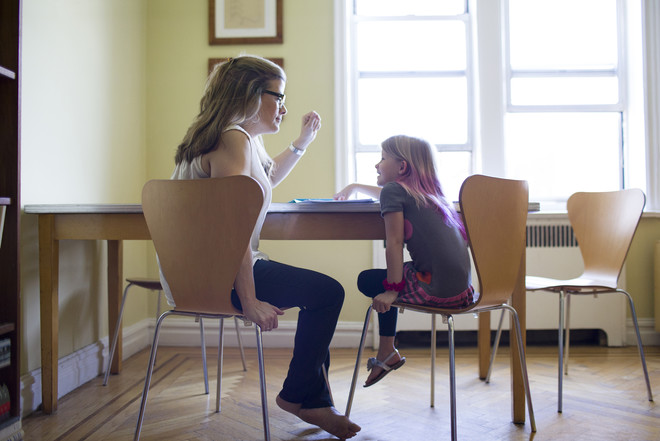General rules of individual conversation
During the conversation, both you and the baby should feel comfortable. To achieve this, you should observe many nuances. Conversations with a child should be confidential. Photo: Getty Here are the main ones:
Conversations with a child should be confidential. Photo: Getty Here are the main ones:
- Be friendly and considerate. Start the conversation with a smile, sincere praise of the interlocutor. Be sure to keep in touch with the eyes, show interest in the interlocutor. At the same time, avoid pressure, so that the child does not think that you are trying to rudely climb into his soul. Keep an eye on your hands and face all the time.
- Be in the zone of your comfort and do not break the comfort zone of the interlocutor. Do not think that the child does not have it.
- Construct interrogative sentences in such a way as to receive positive answers more often.
- Constantly involve the baby in the dialogue, make sure that his answers are not monosyllabic. At the same time, keep the initiative of the conversation.
- Remove psychological stress. To do this, talk on the topic that is most interesting to him.
- Always watch yourself from the outside and be critical of yourself. Remember that a mistake on your part can destroy a trusting relationship.
Be sure to remember these tips, they will help you in communicating not only with your children, but with any people.
Questions as the main conversation tool
Conversation is impossible without questions.Before you start, think carefully about what you will ask your child. Each question should have its own purpose. Start with more general questions and gradually move on to specific ones to find out what interests you. Regardless of the age of the child, choose short and clear questions, there should be a logical transition between them. Never interrupt the child and try to ask him in such a way that he cannot answer simply “yes” or “no”. Be prepared for the fact that in the dialogue you will not be the only one asking questions. Before answering, make sure that you have understood everything correctly. To do this, you can rephrase the question in your own words. Answer the questions as clearly and completely as possible, do not ignore them and do not dodge if you do not know the answer, it is better to honestly admit it. Just as you thought through the plan of questions, think through the plan of answers, because you can roughly imagine what the child will ask you about.
Learn to listen
The ability to listen is valued in any person.This is not as easy as it seems, this skill needs to be learned. While listening, constantly encourage the interlocutor with head nods, words like "uh-huh", "yes-yes" and so on. Do not get distracted by anything. Even simply drawing patterns on paper during a conversation can distract and upset the child. Follow the rules for conducting a conversation with a childPhoto: Getty Be observant while listening. Watch not only your child's words, but also his gestures and facial expressions. Be patient. Prepare enough time for the conversation in advance so as not to rush the child or interrupt him. Repeat the words of the interlocutor periodically, and also use so-called I-messages, for example, "I heard", "I understood". You can ask clarifying questions, the main thing is that they do not interrupt the main speech of the interlocutor.
Follow the rules for conducting a conversation with a childPhoto: Getty Be observant while listening. Watch not only your child's words, but also his gestures and facial expressions. Be patient. Prepare enough time for the conversation in advance so as not to rush the child or interrupt him. Repeat the words of the interlocutor periodically, and also use so-called I-messages, for example, "I heard", "I understood". You can ask clarifying questions, the main thing is that they do not interrupt the main speech of the interlocutor.
Plan a conversation with a baby
A conversation will only be effective if it follows a set pattern. Your dialogue should have a beginning, a climax, and a resolution. Here is a rough outline:
- Support the child. Show interest to him, help start talking. At this stage, use neutral words and calm intonation.
- Clarify the situation. This will help you get more information about the problem. Ask more questions.
- Show the child that you understand what is at stake. Be interested. Repeat the thoughts of the interlocutor, paraphrasing them, highlight the main phrases.
- Show your child that you understand his feelings.Again, rephrase the interlocutor, emphasizing feelings and emotions. Help the child re-evaluate his feelings at this stage. A good phrase for this is: "I think this really upsets you (surprises, saddens, etc.)". This way, the child will look at the emotion from the outside.
- Summarize what was heard. Collect all the basic facts and thoughts voiced in the dialogue.
- The final stage. Demonstrate respect for the interlocutor and his feelings, say that you appreciate his desire to resolve the issue.
A one-on-one conversation will go well if you can reach mutual understanding at every stage.
Receptions from psychology that will help you
Don't rely only on yourself, trust psychologists and their methods. If you are a parent, then you definitely need tounderstand child psychologyPhoto: Getty There are 3 interesting psychological techniques that will help you build a constructive dialogue with a child of any age.
If you are a parent, then you definitely need tounderstand child psychologyPhoto: Getty There are 3 interesting psychological techniques that will help you build a constructive dialogue with a child of any age.
- Mirror of relationships.They say that the eyes are the mirror of the soul, in this case the face is the mirror of relationships. A smile is the main password to the baby's heart. Remember that a kind and gentle facial expression simply screams to your interlocutor: "I'm a friend!" Such a person wants to open up. Communicating with a positive adult, the child himself becomes more positive.
- Gold words. In this case we are talking about compliments. Do not be afraid to make them baby. You can exaggerate the child's abilities a little. The main thing is that the complement should sound natural. Do not use compliments with a double meaning, that is, do not emphasize the qualities of the baby, which are both positive and negative. Also, a compliment should state the fact, but do not contain advice or, even more so, a claim. Remember, the most effective compliment is the one made against the background of the anti-payment itself.
- Patient listener. This is one of the most important psychological techniques. The child will be frank only with those who listen to him attentively, patiently, without interrupting.
These techniques seem simple, but theyreally work. Try them out in the process of communication. Child psychology is a complex thing, so you will probably make mistakes. Don't be afraid of them, be able to admit your mistakes and continue to look for an approach to the baby through communication.









